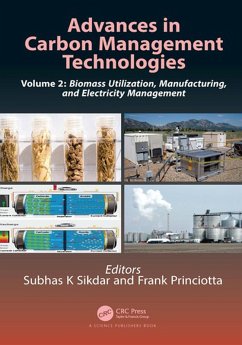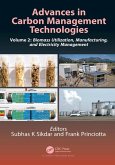Advances in Carbon Management Technologies (eBook, PDF)
Biomass Utilization, Manufacturing, and Electricity Management, Volume 2
Redaktion: Sikdar, Subhas K.; Princiotta, Frank
49,95 €
49,95 €
inkl. MwSt.
Sofort per Download lieferbar

25 °P sammeln
49,95 €
Als Download kaufen

49,95 €
inkl. MwSt.
Sofort per Download lieferbar

25 °P sammeln
Jetzt verschenken
Alle Infos zum eBook verschenken
49,95 €
inkl. MwSt.
Sofort per Download lieferbar
Alle Infos zum eBook verschenken

25 °P sammeln
Advances in Carbon Management Technologies (eBook, PDF)
Biomass Utilization, Manufacturing, and Electricity Management, Volume 2
Redaktion: Sikdar, Subhas K.; Princiotta, Frank
- Format: PDF
- Merkliste
- Auf die Merkliste
- Bewerten Bewerten
- Teilen
- Produkt teilen
- Produkterinnerung
- Produkterinnerung

Bitte loggen Sie sich zunächst in Ihr Kundenkonto ein oder registrieren Sie sich bei
bücher.de, um das eBook-Abo tolino select nutzen zu können.
Hier können Sie sich einloggen
Hier können Sie sich einloggen
Sie sind bereits eingeloggt. Klicken Sie auf 2. tolino select Abo, um fortzufahren.

Bitte loggen Sie sich zunächst in Ihr Kundenkonto ein oder registrieren Sie sich bei bücher.de, um das eBook-Abo tolino select nutzen zu können.
This book was motivated by the desire to compile recent advances in carbon management to examine promises and limitations of emissions measurements, energy efficiencies, carbon capture and sequestration, biomass waste utilization, electric power generation, energy storage, and carbon neutral power from nuclear, hydro, solar and wind.
- Geräte: PC
- ohne Kopierschutz
- eBook Hilfe
- Größe: 34.41MB
Andere Kunden interessierten sich auch für
![Advances in Carbon Management Technologies (eBook, ePUB) Advances in Carbon Management Technologies (eBook, ePUB)]() Advances in Carbon Management Technologies (eBook, ePUB)49,95 €
Advances in Carbon Management Technologies (eBook, ePUB)49,95 €![The Ethics of Nanotechnology, Geoengineering, and Clean Energy (eBook, PDF) The Ethics of Nanotechnology, Geoengineering, and Clean Energy (eBook, PDF)]() The Ethics of Nanotechnology, Geoengineering, and Clean Energy (eBook, PDF)307,95 €
The Ethics of Nanotechnology, Geoengineering, and Clean Energy (eBook, PDF)307,95 €![Handbook of Standards and Guidelines in Ergonomics and Human Factors (eBook, PDF) Handbook of Standards and Guidelines in Ergonomics and Human Factors (eBook, PDF)]() Handbook of Standards and Guidelines in Ergonomics and Human Factors (eBook, PDF)63,95 €
Handbook of Standards and Guidelines in Ergonomics and Human Factors (eBook, PDF)63,95 €![Roman Architecture (eBook, PDF) Roman Architecture (eBook, PDF)]() Frank SearRoman Architecture (eBook, PDF)37,95 €
Frank SearRoman Architecture (eBook, PDF)37,95 €![Grounding Education in Environmental Humanities (eBook, PDF) Grounding Education in Environmental Humanities (eBook, PDF)]() Grounding Education in Environmental Humanities (eBook, PDF)40,95 €
Grounding Education in Environmental Humanities (eBook, PDF)40,95 €![Imagining Apocalyptic Politics in the Anthropocene (eBook, PDF) Imagining Apocalyptic Politics in the Anthropocene (eBook, PDF)]() Imagining Apocalyptic Politics in the Anthropocene (eBook, PDF)43,95 €
Imagining Apocalyptic Politics in the Anthropocene (eBook, PDF)43,95 €![Emerging Practices in Architectural Pedagogy (eBook, PDF) Emerging Practices in Architectural Pedagogy (eBook, PDF)]() Emerging Practices in Architectural Pedagogy (eBook, PDF)19,95 €
Emerging Practices in Architectural Pedagogy (eBook, PDF)19,95 €-
-
-
This book was motivated by the desire to compile recent advances in carbon management to examine promises and limitations of emissions measurements, energy efficiencies, carbon capture and sequestration, biomass waste utilization, electric power generation, energy storage, and carbon neutral power from nuclear, hydro, solar and wind.
Dieser Download kann aus rechtlichen Gründen nur mit Rechnungsadresse in A, B, BG, CY, CZ, D, DK, EW, E, FIN, F, GR, HR, H, IRL, I, LT, L, LR, M, NL, PL, P, R, S, SLO, SK ausgeliefert werden.
Produktdetails
- Produktdetails
- Verlag: Taylor & Francis
- Seitenzahl: 390
- Erscheinungstermin: 31. Januar 2021
- Englisch
- ISBN-13: 9781000220155
- Artikelnr.: 60303223
- Verlag: Taylor & Francis
- Seitenzahl: 390
- Erscheinungstermin: 31. Januar 2021
- Englisch
- ISBN-13: 9781000220155
- Artikelnr.: 60303223
- Herstellerkennzeichnung Die Herstellerinformationen sind derzeit nicht verfügbar.
Subhas K Sikdar retired as Associate Director for Science, National Risk Management Research Laboratory of USEPA. Earlier he held technical and managerial positions at Occidental Research Corp, National Institute of Standards and Technology, and General Electric Corporate Research & Development Center. Dr. Sikdar is an elected Fellow of AAAS, ACS, AIChE, IIChE, and winner of EPA bronze medals, R&D 100 awards, several national awards from AIChE, and distinguished achievement awards from EPA, University of Arizona, and University of Calcutta. He is Editor-in-Chief of Clean Technologies and Environmental Policy (Springer), and serves as a member of the conference committee of Engineering Conferences International. He has edited 16 books. Frank Princiotta recently retired as Director of the Air Pollution Prevention and Control Division of the Office of Research & Development, Environmental Protection Agency. He has a degree in Chemical Engineering from City University of NY (Tau Beta Pi, Omega Chi Epsilon) and a Nuclear Engineering Certificate from the Oak Ridge School of Reactor Technology. His division is responsible for RD & D on technologies for controlling and characterizing air pollution from major sources. He has been a key agency expert in air pollution control for over 40 years. He has been the recipient of an EPA gold medal, and three bronze medals for his accomplishments in the air pollution control field. He has also received the President's Meritorious Executive Award on two separate occasions (Presidents Carter and H.W. Bush). He played the leadership role in the development and demonstration of sulfur dioxide pollution control technology for coal-fired boilers, which has been the mainstay of SO2 control worldwide. An author of many scientific papers on air pollution control, he has been a frequent speaker before technical societies and conferences and has testified before Congressional Committees. In recent years he has focused on mitigating global climate change. He has analyzed the role that technology and cultural changes will need to play, if we are to avoid the potentially catastrophic impacts associated with unconstrained use of energy.
Introductory Chapter. What key low-carbon technologies are needed to meet
serious climate mitigation targets and what is their status. SECTION 1.
BIOMASS SECTOR. Biomass as a source for heat, power, and coproducts. The
Brazilian experience on the use of bioethanol. Biomass in regional and
local context. Prioritizing uses for woody biowaste: a case study from
British Columbia. Industrial oleochemicals from used cooking oils (UCOs)-
sustainability benefits and challenges. Advances in carbon capture through
thermochemical conversion of biomass waste. Phytowaste processing.
Anaerobic digestion for energy recovery and carbon management. Critical
aspects in developing sustainable biorefinery systems based on
bioelectrochemical technology with carbon dioxide capture. Synthesis of
regional bioproducts supply networks. Supply chain analysis for advancing
carbon and nutrient recovery from organic waste. Efficient and low-carbon
energy solution through polygeneration with biomass. SECTION II.
MANUFACTURING AND CONSTRUCTION (BATTERIES, BUILT ENVIRONMENT, AUTOMOTIVE,
AND OTHER INDUSTRIES). Urban carbon management strategies. Lean and green
(L&G) manufacturing. Advances, challenges and opportunities of Li-ion
batteries for electric vehicles. Charging strategies for electrified
transport. SECTION III. ELECTRICITY AND THE GRID. Microgrids' role in grid
decarbonization. Storage of fluctuating energy. Lithium ion batteries -
future technology development driven by environmental impact. Carbon
constrained electricity sector planning with multiple objectives.
serious climate mitigation targets and what is their status. SECTION 1.
BIOMASS SECTOR. Biomass as a source for heat, power, and coproducts. The
Brazilian experience on the use of bioethanol. Biomass in regional and
local context. Prioritizing uses for woody biowaste: a case study from
British Columbia. Industrial oleochemicals from used cooking oils (UCOs)-
sustainability benefits and challenges. Advances in carbon capture through
thermochemical conversion of biomass waste. Phytowaste processing.
Anaerobic digestion for energy recovery and carbon management. Critical
aspects in developing sustainable biorefinery systems based on
bioelectrochemical technology with carbon dioxide capture. Synthesis of
regional bioproducts supply networks. Supply chain analysis for advancing
carbon and nutrient recovery from organic waste. Efficient and low-carbon
energy solution through polygeneration with biomass. SECTION II.
MANUFACTURING AND CONSTRUCTION (BATTERIES, BUILT ENVIRONMENT, AUTOMOTIVE,
AND OTHER INDUSTRIES). Urban carbon management strategies. Lean and green
(L&G) manufacturing. Advances, challenges and opportunities of Li-ion
batteries for electric vehicles. Charging strategies for electrified
transport. SECTION III. ELECTRICITY AND THE GRID. Microgrids' role in grid
decarbonization. Storage of fluctuating energy. Lithium ion batteries -
future technology development driven by environmental impact. Carbon
constrained electricity sector planning with multiple objectives.
Introductory Chapter. What key low-carbon technologies are needed to meet
serious climate mitigation targets and what is their status. SECTION 1.
BIOMASS SECTOR. Biomass as a source for heat, power, and coproducts. The
Brazilian experience on the use of bioethanol. Biomass in regional and
local context. Prioritizing uses for woody biowaste: a case study from
British Columbia. Industrial oleochemicals from used cooking oils (UCOs)-
sustainability benefits and challenges. Advances in carbon capture through
thermochemical conversion of biomass waste. Phytowaste processing.
Anaerobic digestion for energy recovery and carbon management. Critical
aspects in developing sustainable biorefinery systems based on
bioelectrochemical technology with carbon dioxide capture. Synthesis of
regional bioproducts supply networks. Supply chain analysis for advancing
carbon and nutrient recovery from organic waste. Efficient and low-carbon
energy solution through polygeneration with biomass. SECTION II.
MANUFACTURING AND CONSTRUCTION (BATTERIES, BUILT ENVIRONMENT, AUTOMOTIVE,
AND OTHER INDUSTRIES). Urban carbon management strategies. Lean and green
(L&G) manufacturing. Advances, challenges and opportunities of Li-ion
batteries for electric vehicles. Charging strategies for electrified
transport. SECTION III. ELECTRICITY AND THE GRID. Microgrids' role in grid
decarbonization. Storage of fluctuating energy. Lithium ion batteries -
future technology development driven by environmental impact. Carbon
constrained electricity sector planning with multiple objectives.
serious climate mitigation targets and what is their status. SECTION 1.
BIOMASS SECTOR. Biomass as a source for heat, power, and coproducts. The
Brazilian experience on the use of bioethanol. Biomass in regional and
local context. Prioritizing uses for woody biowaste: a case study from
British Columbia. Industrial oleochemicals from used cooking oils (UCOs)-
sustainability benefits and challenges. Advances in carbon capture through
thermochemical conversion of biomass waste. Phytowaste processing.
Anaerobic digestion for energy recovery and carbon management. Critical
aspects in developing sustainable biorefinery systems based on
bioelectrochemical technology with carbon dioxide capture. Synthesis of
regional bioproducts supply networks. Supply chain analysis for advancing
carbon and nutrient recovery from organic waste. Efficient and low-carbon
energy solution through polygeneration with biomass. SECTION II.
MANUFACTURING AND CONSTRUCTION (BATTERIES, BUILT ENVIRONMENT, AUTOMOTIVE,
AND OTHER INDUSTRIES). Urban carbon management strategies. Lean and green
(L&G) manufacturing. Advances, challenges and opportunities of Li-ion
batteries for electric vehicles. Charging strategies for electrified
transport. SECTION III. ELECTRICITY AND THE GRID. Microgrids' role in grid
decarbonization. Storage of fluctuating energy. Lithium ion batteries -
future technology development driven by environmental impact. Carbon
constrained electricity sector planning with multiple objectives.







